Late winter 2023: Vinegar Syndrome and partners
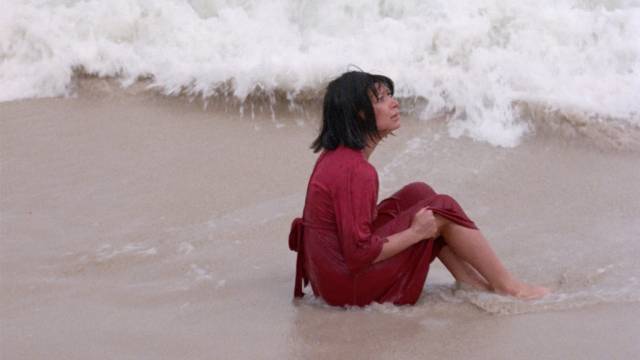
Time once again for some quick notes on what I’ve been watching over the past few months but haven’t mentioned yet. These are movies I watched while hunkered down in my apartment in the aftermath of my second heart attack, while winter sapped my will to get outside and move around. I have to admit that these circumstances haven’t done much for my ability to focus, so some of these movies didn’t leave much of an impression. I should have tried harder because now I’m back at work, it feels as if I squandered much of the time I had available – my determination to get to a lot of interesting movies I have sitting on the shelf remained unacted on and now work is once again constricting what time I do have.
Vinegar Syndrome
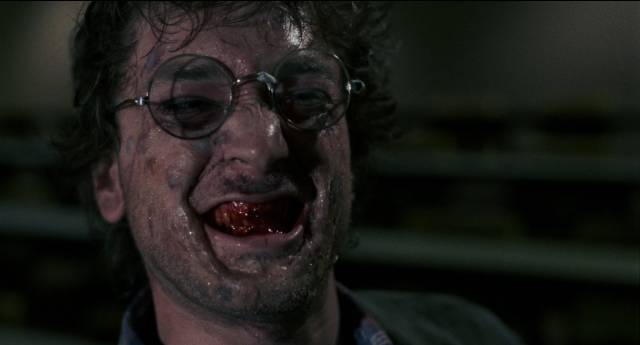
Primal Rage (1988) is one of those made-in-Florida Italian productions from the late ’80s, co-written by none other than Umberto Lenzi just before he made his own Nightmare Beach (1989). This one, though, was directed by first-timer Vittorio Rambaldi and it benefits from contributions by the director’s father Carlo, who provides an animatronic baboon and some very oozy gore effects. Student newspaper reporters uncover creepy experiments by Dr. Ethridge (Bo Svenson) and inadvertently release a rage virus which spreads around the campus, climaxing at the annual Halloween dance – which is a highlight as there are many interesting costume designs. A bit slow, but this low-budget precursor to 28 Days Later (2002) has its moments.
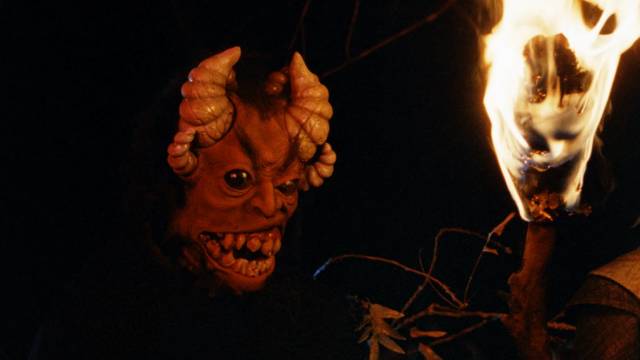
The Devonsville Terror (1983) by Ulli Lommel gets an upgrade from the 88 Films Blu-ray I watched last year (but apparently didn’t get around to mentioning). It’s suspiciously similar to Bill Rebane’s The Demons of Ludlow (1983), which Rebane made immediately after renting his Wisconsin studio to Lommel for this. Devonsville is one of the German transplant’s better low-budget American movies, thanks in part to a strong performance by his then-wife and co-writer Susanna Love as the new teacher in a small New England town where three women were executed for witchcraft several centuries ago. Along with the teacher, there are two other new women in town and not surprisingly they seem to be connected to the witches and are here to bring down vengeance on the descendants of those who tortured them. Donald Pleasence puts in an appearance and past horrors resurface as the locals succumb to madness and violence. (Lommel’s better-known The Boogey Man [1980] is due in a 4K restoration from Vinegar Syndrome in May.)
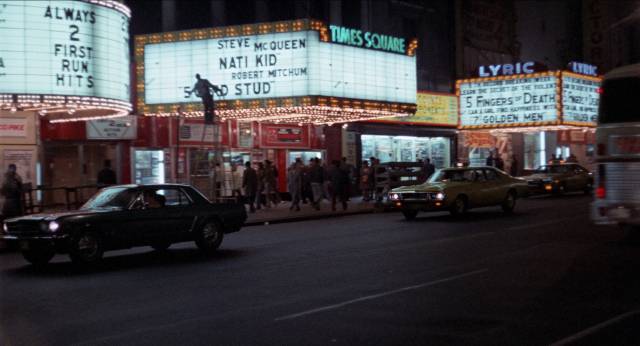
Massage Parlor Murders (1974) benefits from a lot of location shooting in and around Times Square long before it was cleaned up and transformed into an urban theme park for tourists. The clunky story of a couple of incompetent detectives investigating a series of murders in local massage parlours serves mostly as a hook on which to hang gritty images of sleazy clubs and grindhouse theatres which provide a record of the legendary area which has long-since disappeared. The ambience is similar to Abel Ferrera’s The Driller Killer (1979), though co-directors Chester Fox and Alex Stevens lack Ferrera’s obsessive intensity, giving the movie a slack shapelessness which fumbles the climax.
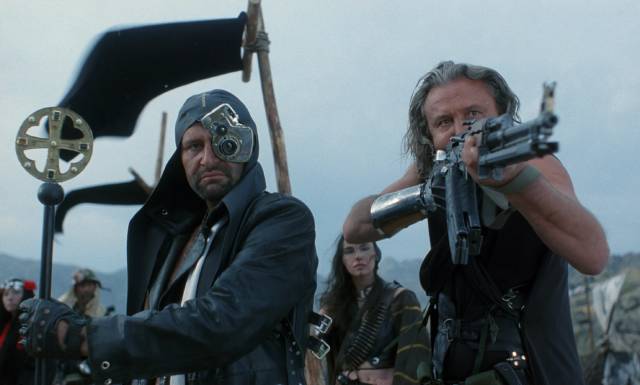
Goodbye 20th Century (1998) is the visually striking, somewhat impenetrable debut feature of Macedonian filmmakers Darko Mitrevski and Aleksandar Popovski. A disjointed collection of sequences spanning more than a hundred years, mixing violence and absurdist slapstick to say something about what a lost cause humanity is, it begins in a post-apocalyptic future in which members of a tribe try to execute a man they believe has brought down a curse on the community. Having shot him, they (and he) discover that for some reason he’s immortal. Banished, he wanders away, confronts a trickster figure among industrial ruins, and comes across hieroglyphics which offer some clue to his existence … or something. Then at the turn of the 20th Century an incestuous wedding ends with the murder of the brother-groom. Then just before the turn of the 21st Century, a man dressed as Santa Claus visits a wake, where bizarre family members greet him with hostility and the solemn occasion degenerates into chaos and violence… There are moments of resonant mystery, others of crude comedy, but what it adds up to never came into focus for me.
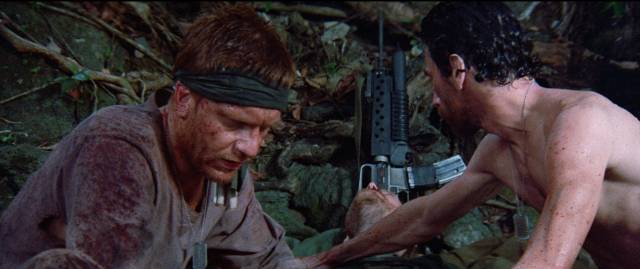
Dog Tags (1987) is a grim Vietnam war movie made by Italian Romano Scavolini, best known for one of the most notorious slashers of the ’80s, Nightmare in a Damaged Brain (1981). Although its tone is bleak and serious, rather than trashily exploitative, its darkness and cynicism doesn’t lead anywhere – it’s just a given. War is hell and people die regardless of how good or bad they might be as individuals. The chief problem is that none of the characters are ever fleshed out, barely even achieving the basic status of stereotype. After a small unit rescues several prisoners from tiger cages – what’s to come is foreshadowed by the prisoners fighting viciously among themselves – their helicopter rendezvous is aborted and their commander tells them by radio that they have to get through thirty miles of boobytrapped jungle to retrieve vital material from a crashed helicopter. Along the way, they fight among themselves, trigger those boobytraps, get injured, go mad and die. Only three make it to the objective, discovering that what they’ve been sent for isn’t crucial documents but rather boxes of South Vietnamese gold, treasure which their commander plans to kill them for. It’s all futile – a prologue and epilogue set ten years later make it clear that no one has survived to enjoy the gold – and the dour tone ensures that any B-movie action-adventure thrills are totally suppressed, so the movie lacks either the grand thematic pretensions of Apocalypse Now and The Deer Hunter or the trashy thrills of a Rambo or Missing in Action, despite production values being better than expected.
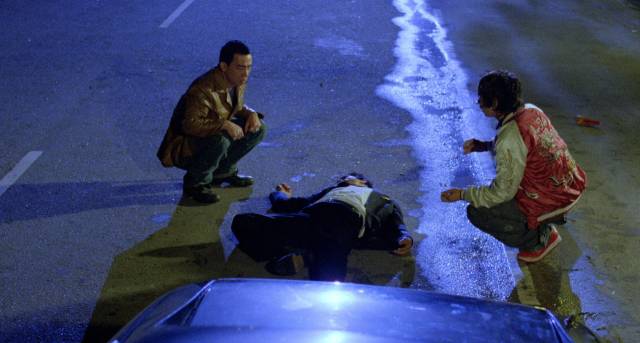
Bio-Zombie (1998) is a slacker zombie movie directed by Wilson Yip before he teamed up with Donnie Yen for numerous contemporary thrillers and martial arts movies (including the Ip Man trilogy). A couple of bickering friends who run a small bootleg video store in a big shopping mall find themselves in the middle of a zombie apocalypse when a smuggled biological weapon is accidentally leaked. The oozing sores and spraying blood and vomit are played more for laughs than horror and the comic riffs on Dawn of the Dead are too broad for my taste, so when it eventually turns dark and tries for some moments of emotional engagement they don’t really connect.
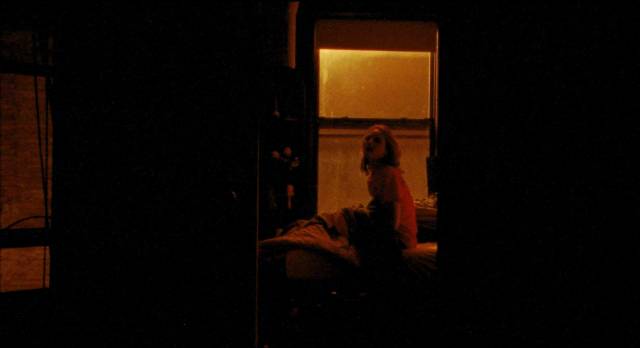
The Scary of Sixty-First (2021) is an uncomfortable attempt at horror rooted in something much more real. The explicit references to Jeffrey Epstein and his crimes place demands on the fictional story which it can’t fully justify, so some of the queasy discomfort the film evokes comes from the feeling that very real suffering is being exploited gratuitously. Nonetheless, first-time director Dasha Nekrasova – who also co-wrote the script with actor Madeline Quinn, who co-stars – does create some effective scenes which build increasing tension on the way to a violent, but murky climax. A couple of friends (whose relationship seems at risk of collapsing at any moment) find one of those too-good-to-be-true apartments in Manhattan, way below market value and immediately giving off clues that something isn’t right. When a mysterious woman named simply The Girl (director Nekrasova) shows up and claims that it was one of the places Epstein used for his pedophilic crimes, Noelle (co-writer Quinn) is sucked down a paranoid rabbit hole researching Epstein and the high-level network of trafficking and abuse he ran, while roommate Addie (Betsey Brown), a victim of childhood abuse herself at the hands of her father, seems to become possessed by the lingering atmosphere of horror in the apartment. The bloody climax suggests that Epstein was merely part of a much greater conspiracy of pedophiles and that those controlling it have the power to destroy anyone who dares to look too closely into their actions.
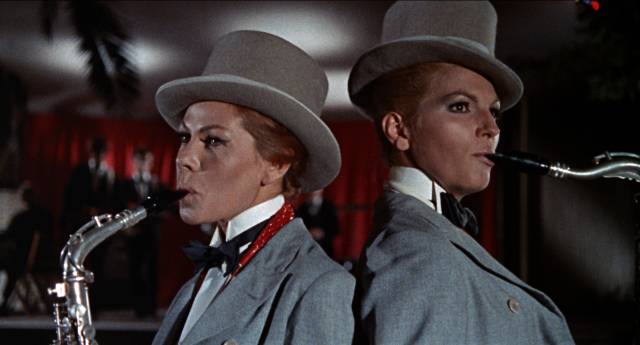
Two Undercover Angels/Kiss Me Monster (1969) capped a very busy decade for Jess Franco, reviving a pair of female detectives dubbed the Red Lips from his 1960 movie of the same name. Compared to some of his work during the ’60s, these two seem like throwaways, breezy and insubstantial comedy “thrillers” which mock a genre already given to parody and pastiche. Not much in the way of plot, they’re mostly an excuse for colourful eye candy as stars Janine Reynaud and Rosanna Yanni exchange banter, hang out at nightclubs and skulk around cellars where villains do nefarious things. In Two Undercover Angels, Diana (Reynaud) and Regina (Yanni) investigate a sinister artist (Adrian Hoven) and his werewolf-like assistant Morpho (Michel Lemoine) who seem to be behind the murder/disappearance of a number of models; there’s even less plot (and coherence) in Kiss Me Monster, with the Red Lips moonlighting as strippers when a dead man on the doorstep sets them on the trail of a mad scientist … or something. The dubbing is often very bad, the jazzy scores by Jerry Van Rooyen quite catchy, and the photography at times eye-popping.
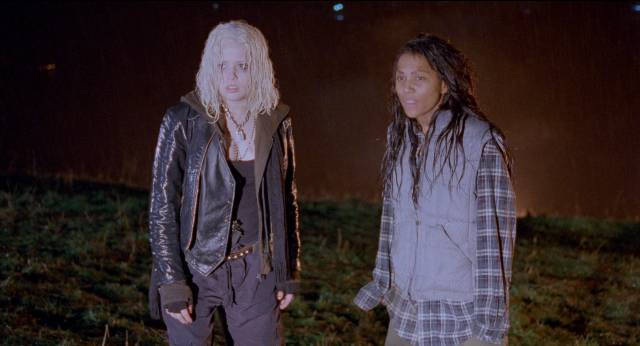
Freeway II: Confessions of a Trickbaby (1999) is Matthew Bright’s follow-up to his debut feature, Freeway (1996), and like that movie recasts the elements of a fairytale as a violent black comedy centred on a teenage girl at war with a society which has already deemed her a worthless lost cause. Following in the footsteps of Reese Witherspoon’s Little Red Riding Hood, here we have Natasha Lyonne’s White Girl who we gradually realize belongs to a reworked version of Hansel and Gretel, though here her partner isn’t a brother but rather a violent, psychotic serial killer named Cyclona (Maria Celedonio). When White Girl is railroaded by the system into a twenty-five year sentence for a string of petty crimes, she meets her new cellmate who’s in for life and the pair escape and head across country. Cyclona wants to find Sister Gomez, whom she remembers taking care of her as a child, and she casually kills anyone who gets in the way, much to White Girl’s irritation. When they finally make it to Tijuana and Sister Gomez, the truth of Cyclona’s past surfaces – and the pair find themselves trapped in the witch’s lair, being fattened up for a grim fate. The unsavoury truth about Sister Gomez, pedophile and cannibal, is signalled by the casting of Vincent Gallo; though today the conflation of gender fluidity and monstrosity may seem problematic, Gallo is very effective as the fairytale villain. Lyonne and Celedonio are both excellent as the gleefully antisocial heroines.
Alongside these more recent releases, there have been a number of back catalogue titles.
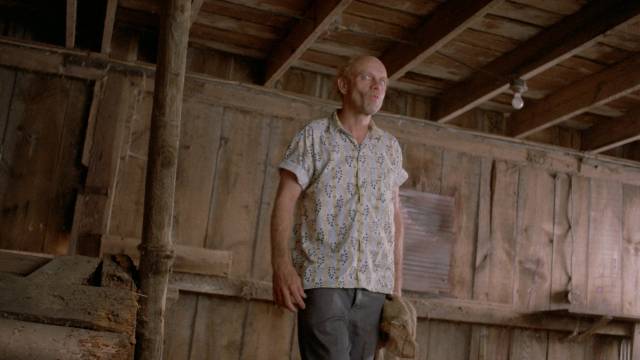
Luther the Geek (1989), written and directed by Carlton J. Albright, who had written and produced exploitation favourite The Children (1980), is a cheerfully comic and creepy slice of rural horror in which sideshow freak Luther (Edward Terry) is implausibly released from a psych ward and goes on a violent rampage, targeting a family beset by its own twisted psychological problems. Terry as Luther gives an unsettlingly enthusiastic portrayal of madness.
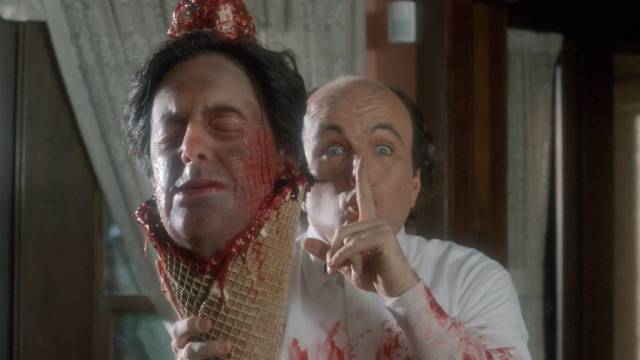
Ice Cream Man (1995), the only “legitimate” movie directed by porn filmmaker Norman Apstein, has another deranged character released from a sanatorium and going on a killing spree. Like Luther, Gregory (Clint Howard) suffered from childhood trauma and acts out in problematic ways – in this case, driving around in an ice cream truck, kidnapping and killing neighbourhood kids, though he befriends one and manages to set him on his own deranged path. Like Luther the Geek, the mix of horror and comedy rests firmly on the performance of the star and, like Edward Terry, Clint Howard is definitely up to the task.
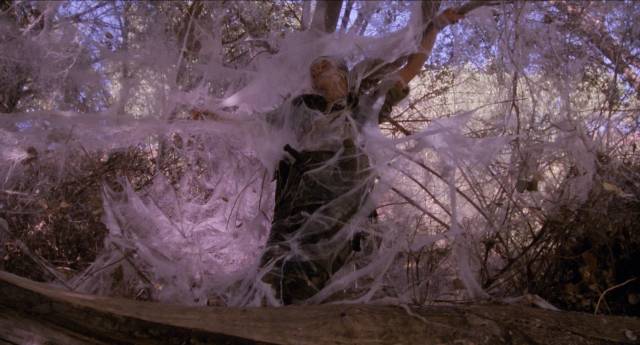
Xtro 3 (1995) is a sequel in name only to Harry Bromley Davenport’s Xtro (1982), which I actually saw and liked in its theatrical run. The two largely unrelated sequels were both released directly to video. In number 3, a ragged unit of military misfits are assigned to go to a remote island, supposedly to clean up a bunch of unexploded ammo left by decades of training exercises – but they’ve actually been set up by Major Guardino (Robert Culp) as victims of an alien imprisoned on the island since the ’50s. The original Xtro was creepy and disturbing; this one is more of a straightforward action movie, but it works efficiently on that level.
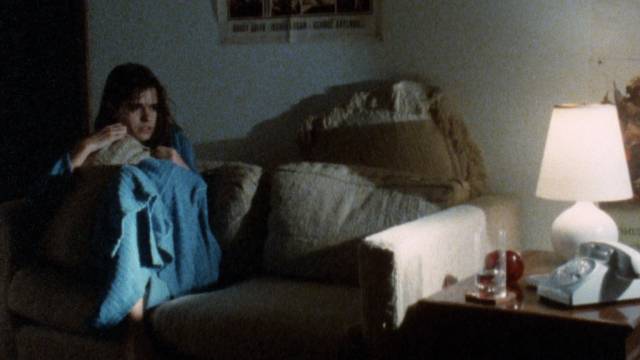
Disconnected (1983), a low-budget 16mm production from Connecticut filmmaker Gorman Bechard, embraces the video culture of its time by having lead character Alicia (Frances Raines, apparently niece of the better known Claude) work in a video store. She rather unwisely agrees to date Franklin (Mark Walker), a creepy customer whom we already know is a serial killer whose deeds are baffling local police. She also has a twin sister (Raines again) who has a habit of stealing her boyfriends. There’s not much suspense, given the early revelation about Franklin’s crimes, but in retrospect there’s an oddly Lynchian touch – at the beginning, Alicia helps an old man who’s looking for her neighbour, but when she goes to the kitchen to get him a drink, he vanishes; then throughout the movie she’s plagued by strange, threatening phone calls, with the old guy making another surprise appearance at the end. This odd supernaturally-tinged thread has nothing to do with the rest of the movie, but suggests something more interesting than the rather routine psycho story itself.
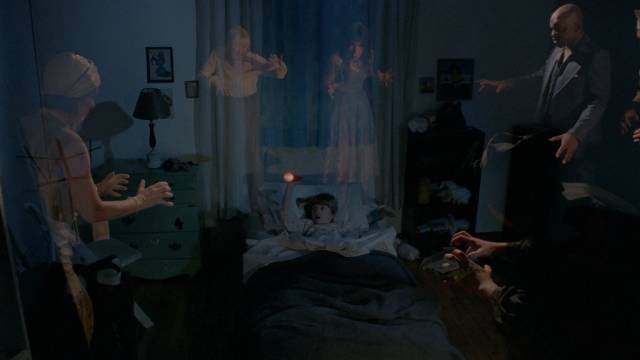
A Woman’s Torment (1977), Lurkers (1987) and Prime Evil (1988) are my first exposure to New York filmmaker Roberta Findlay, notorious for her connection (with husband Michael Findlay, for whom she photographed Shriek of the Mutilated [1974]) to Snuff (1976), claimed by its distributor to show a real-life murder. During her three-decade career, Findlay produced, directed and photographed dozens of exploitation movies ranging from horror to outright porn. The latter is represented by A Woman’s Torment, a psycho-drama about a woman losing her grip on reality and killing a series of sexual partners at an off-season beach house; obviously influenced by Roman Polanski’s Repulsion (1965), but much more graphic, it occasionally manages to achieve a haunting quality in part due to an odd lead performance from Tara Chung. The other two titles, sharing a single disk, are a pair of supernatural horrors which are kind of rough and sloppy – obviously very low budget, they suggest rushed production – but nonetheless do achieve some effective moments, thanks to the grungy NYC locations, and offer occasional suspenseful sequences. In Prime Evil, a group of apostate monks who escaped the plague in Medieval Europe by making a deal with the Devil survive by performing regular sacrifices every thirteen years – a young nun goes undercover to infiltrate the cult and prevent the next, imminent sacrifice; and in Lurkers, a woman with a traumatic childhood is haunted by a group of lost souls determined to bring her into the fold (there’s more than a hint of Michael Winner’s The Sentinel [1977] here).
As always with Vinegar Syndrome, these disks display transfers which range from decent to excellent within the limitations of the source materials, and there are various interviews, featurettes and occasional commentaries.
*
Vinegar Syndrome Partners
Vinegar Syndrome continue to expand on the collection of small labels gathered under their distribution umbrella (now totalling a couple of dozen), covering everything from the cheapest obscurities to arthouse independents, from documentaries to animation, resurrected exploitation to a wide range of foreign titles.
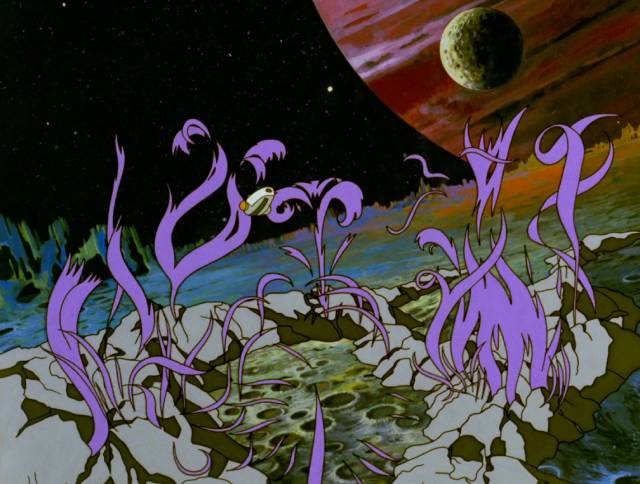
Delta Space Mission (1984) is a somewhat psychedelic animated feature from Romania, which apparently had a flourishing animation industry under the oppressive Ceausescu regime. Directed by Calin Cazan and Mircea Toia, the film’s animation is limited, but the design and backgrounds are often rich and imaginative. The episodic narrative involves a new supercomputer installed in an exploration spacecraft which becomes sentient and infatuated with an alien reporter. The ship goes rogue and pursues the reporter with a stalker’s single-minded focus. Various planets are visited and dangers faced; though the artwork is vivid and inventive, the animation itself is quite limited. Perhaps the closest western analogues would be the three features created by Rene Laloux (Fantastic Planet [1973], The Masters of Time [1982] and Gandahar [1987]) and Heavy Metal (Gerald Potterton et al., 1981). I haven’t yet watched Cazan and Toia’s follow-up The Son of the Stars (1985), which has also been released by Deaf Crocodile. (Deaf Crocodile Blu-ray with Kat Ellinger commentary, director interview, plus a couple of related shorts)
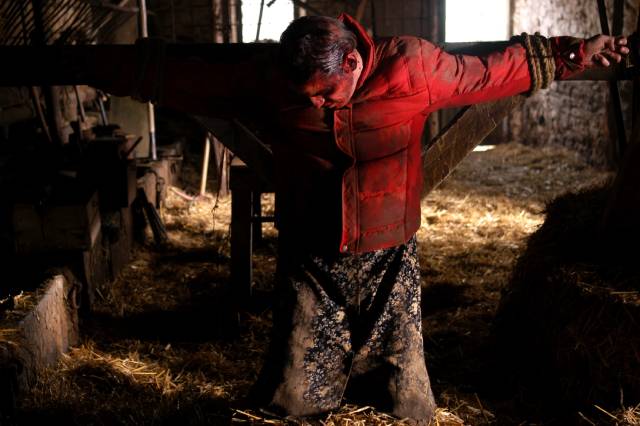
Calvaire (2004) is a strange, disturbing Belgian version of the familiar genre trope of unsuspecting travellers running afoul of deranged rural folk. While movies like The Texas Chain Saw Massacre and The Hills Have Eyes conflate class conflict with cannibalism, co-writer/director Fabrice du Welz focuses on twisted psycho-sexual currents. Marc Stevens (Laurent Lucas) is a singer who, after performing at an old folks home where his lounge act is misinterpreted by an elderly woman as sexual interest, heads off to another gig. But his vehicle breaks down somewhere in the sticks and he finds shelter at a derelict inn. There’s something off about friendly innkeeper Bartel (Jackie Berroyer), though, and he sabotages the vehicle to keep Marc around; deserted some time ago by his wife, who was also a singer, Bartel sees Marc as his wife returned. But he’s not the only crazy one; other locals, who entertain themselves by gang-raping farm animals, strangely accept Bartel’s delusion. In an echo of Straw Dogs, the villagers besiege the inn, beat Bartel up, and rape Marc, who manages to escape (wearing the wife’s dress) across the frozen marsh, pursued by Bartel. The bleak ending leaves things unresolved, with Marc’s identity now in confusion. Creepy, perverse, darkly comic, Calvaire works as well as any of its better-known cousins as a warning about wandering off the main highway. (Yellow Veil Pictures Blu-ray with director commentary, interview, featurettes and a short film)
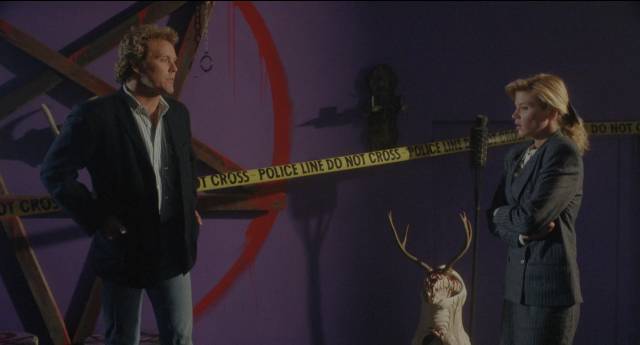
Mind, Body & Soul (1992) is much less successful in its own particular genre niche – in this case, it’s about an innocent who becomes tangled with a Satanic cult which wants her for a ritual sacrifice. To mark their 90-day anniversary, Carl (Jesse Kaye) takes Brenda (Ginger Lynn) to a party where everyone is wearing masks and black robes, but before things get going there’s a police raid. Confused, Brenda is the only one who doesn’t run and finds herself arrested on suspicion of being involved in the cult’s murderous activities. Friendly lawyer John Stockton (Wings Hauser) has her released into his custody, but not surprisingly he has ulterior motives which are eventually revealed. Director Rick Sloane can’t inject much tension or excitement into the sluggish story, but at least there’s Wings to add a bit of quirky interest on the way to a Black Mass that goes wrong. (Culture Shock Releasing Blu-ray with director commentary and new and archival interviews)

Lieutenant Jangles (2018) attempts the tricky feat of trying to be bad for comic effect and gets mixed results. First-time director Nic Champeaux goes full-bore with a pastiche of ’80s action movies – excessive violence, offensive dialogue, over-the-top acting and even bad dubbing – with the story of a vengeful cop in a crime-ridden Australian city who takes on heavily armed mobsters in gun battles loaded with gushing blood and gore. Champeaux doesn’t so much recapture the style of his influences as mock them relentlessly a la Airplane! (1980) and Police Squad! (1982), though he doesn’t have as much wit as Jim Abrahams and the Zucker brothers. Probably best seen with friends and plenty of beer. (Enjoy the Ride Media Blu-ray with commentary, deleted scenes, a making-of and multiple featurettes)
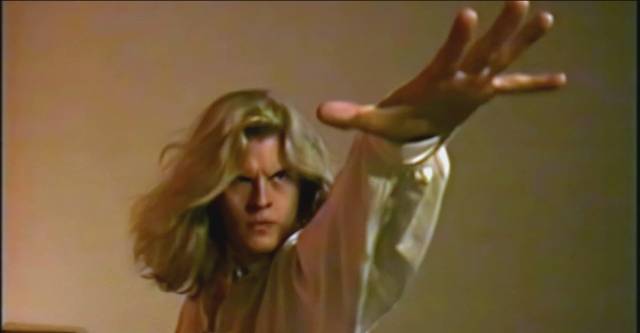
The Good Book (1997) is an interesting example of direct-to-video movie-making from fairly late in that form’s glory days. Obviously made with a limited budget, it nonetheless displays some genuine ambition. Director Matthew Giaquinto, whose only feature it is, was an editor and that shows in the shooting (on Hi-8, using widescreen framing), which is more than simple recording of actors saying their lines; he constructs scenes and aims at expressive visuals to give some texture to the story. That story is a lo-fi tale of society’s collapse; environmental decay keeps everyone confined to their homes, connected to a global communication network controlled by a single corporation. Anyone who disconnects and goes outside becomes a mindless zombie … anyone, that is, except corporate employees who maintain the network, making house calls which occasionally require them to fight through clusters of those zombies. Repairman Joseph Cyrus (Bryan Campbell), a slacker frequently berated by his boss, begins to receive cryptic messages over the network which may be real or hallucination; these escalate to in-person encounters with a mysterious figure, possibly a god or demon, who wants to recruit Joseph in a plan to upload a virus into the network to bring the system to an end. The movie is conceptually more sophisticated than its resources are ultimately able to support, its biggest weakness being the amateurish acting; but given what it does manage to accomplish, it seems a pity that Giaquinto didn’t make any other movies. (Saturn’s Core Blu-ray with commentary, feature-length making-of, featurettes and short films)
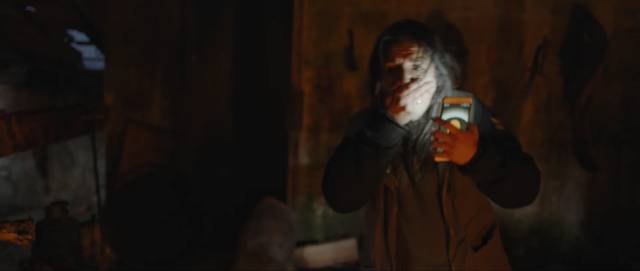
Dachra (2018) is at once the most interesting and frustrating movie in this particular batch. Interesting because it’s not only the first horror film I’ve seen from Tunisia – it’s the first movie of any kind I’ve seen from Tunisia. The setting itself creates interest, and the movie has a creeping atmosphere of dread … but there are issues. It seems obvious that one of writer-director Abdelhamid Bouchnak’s inspirations was The Blair Witch Project (1999) – the story involves three students who head for a remote village to investigate stories of witchcraft – but unfortunately it draws heavily on one of that movie’s most irritating qualities: the three friends endlessly bicker and argue and get on each other’s nerves as they get deeper into a mystery which they remain largely blind to as they waste their energy in petty conflicts.
There’s also the conceit that this is “based on real events”, as in it draws on contemporary stories of supposed witchcraft in Africa, stories which involve the persecution and even murder of people suspected of practising magic. Being a horror movie, inevitably the students’ rational disbelief and sociological interest runs up against real evil – which means that the movie finally comes down in confirmation of the danger posed by “witches”, inadvertently(?) justifying the brutality inflicted on those who inspire superstitious distrust from their neighbours. Perhaps this problem stems from Bouchnak’s choice to tell his story through western genre conventions which dictate certain narrative and thematic choices which require that the horror must be real and for the rational outlook to be proved inadequate for a full understanding of a world beset by malevolent supernatural forces. (Dekanalog Blu-ray with brief introduction by curator Evrim Ersoy)
Comments